About Lloyd EcoDistrict
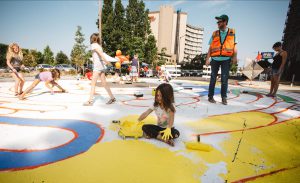
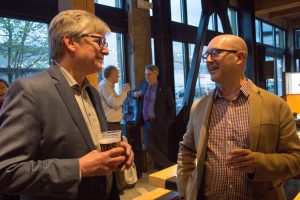
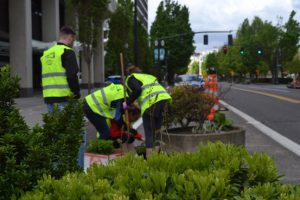
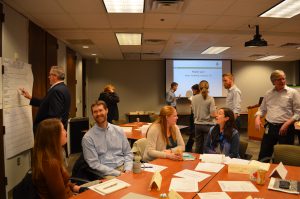
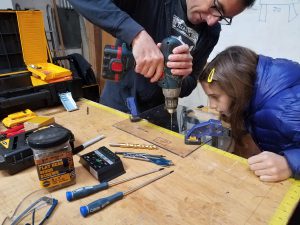
Vision: Our vision is to ensure Portland’s Lloyd neighborhood is one of the most sustainable neighborhoods in North America, and a leader in equity, resilience, and climate protection at the local level.
Mission: We engage the community, form partnerships, and develop programs that create a connected, prosperous, and resilient neighborhood.
How We Work: We set goals and implement initiatives in Lloyd addressing connectivity, health & wellbeing, living infrastructure, peace, place, prosperity, and resource regeneration.
About Lloyd EcoDistrict
In 2009, the City of Portland, the Portland Development Commission (now Prosper Portland), and other local government interests convened a group of Lloyd District stakeholders to determine the feasibility of a “Green District.” There was interest on the part of business leaders and property owners to engage in the effort, so much so that Lloyd business owners directly supported the initiative for the first three years. In 2014, Lloyd EcoDistrict was formally funded by the Enhance Services District
In the beginning, our work was focused on creating a business case and value proposition for sustainability, directed mainly to employers and employees of Lloyd. As our work developed and as we became more involved in the community, our mission and vision expanded to include a wider definition of sustainability, and a more inclusive view of the entire spectrum of our community.
In 2018-2019 we developed a formal Imperatives Commitment to center equity, resilience, and climate protection in our work and decision-making. In 2021-2022, understanding that the coming years will be transformative for our neighborhood and our organization, and to deepen and diversify our work in the community and support this transformation, we pursued formal EcoDistrict certification with the engagement of hundreds of stakeholders throughout the neighborhood. We became EcoDistrict certified in the summer of 2022, with a community-developed roadmap to prioritize equity, resilience, and climate protection at the neighborhood level. We are excited to work with the Lloyd community to implement this roadmap over the next decade.
Lloyd: Past & Present
Indigenous communities have been the original stewards of the land that is today called Lloyd since time immemorial. The Lloyd neighborhood, and the City of Portland, occupies the traditional and stolen ancestral lands of the Cowlitz, Clackamas, Bands of Chinook, Kathlamet, Multnomah, Tualatin Kalapuya, Wasco, and many other tribes who made their homes along the Willamette and Columbia Rivers.
In the 1800s, over 50,000 white settlers came to Oregon and began driving out these indigenous communities. By the mid-1840s, it is estimated that the area’s indigenous population had decreased by as much as 90% due to disease. Portland was incorporated as a city in 1851, and Oregon became a state in 1859—the only state with a constitution that banned Black people from entering, residing in, or holding property in the state. Though these laws were superseded by the passage of the 13th, 14th, and 15th Amendments, the Black population was quite small in Portland at the turn of the 20th century. Many of those who did live in Portland lived in Lower Albina, part of present-day Lloyd. Click here for more (https://www.theatlantic.com/business/archive/2016/07/racist-history-portland/492035/)
Lloyd has a long history of both tension and transformation. Throughout much of the last century, the majority of Portland’s Black community lived in Lower Albina, which overlaps with Lloyd, due to discriminatory real estate and banking practices. Many developers and public agencies set their sights on Lloyd after World War II, and over the ensuing decades, urban renewal projects—such as the interstate freeway system and Memorial Coliseum—largely displaced these communities and turned Lloyd into the business and entertainment district that it is largely known for today. In 2021, Albina Vision Trust introduced an Albina Community Investment Plan, which seeks to create a framework for an inclusive community in Lower Albina while also healing the wounds of previous urban development that displaced and disempowered Portland’s Black community. The Community Investment Plan will show how a community anchored in sustained affordability, livability, and diversity can provide value to Lower Albina.
Lloyd and Lower Albina have shared aspects of their histories, yet the western and eastern sections of the neighborhood developed quite differently. The western portion of modern-day Lloyd includes portions of the Lower Albina. The eastern portion traces its modern history back to Ralph Lloyd, a California rancher, oilman, and real estate developer who purchased the undeveloped land just north of Sullivan’s Gulch in 1926 with the vision of building a second Portland downtown, complete with apartments, shops, and government office buildings. Over the next two decades, he continued buying houses and attempting to realize his vision, but a lack of community and city support meant his vision never materialized. After his death in 1953, his daughters built a hotel, office towers, and the Lloyd Center—then advertised as the largest shopping mall in the world.
Today, Lloyd features an array of businesses, restaurants, entertainment, and housing. Millions of people each year visit the Oregon Convention Center, the Lloyd Center shopping mall, and the Moda Center sports arena for business and leisure. Public spaces like the Eastbank Esplanade, Peace Memorial Park, and a new pedestrian/bike bridge on the developing Green Loop play important roles for those biking and walking around the city.
At Lloyd EcoDistrict, we are committed to honoring the complex history of this neighborhood and the role of urban development in displacing communities of color and upholding white supremacy. As we develop and implement programs to address expansive definitions of sustainability and community development, we are committed to continuing our own work as individuals, as an organization, and within the Lloyd community.
